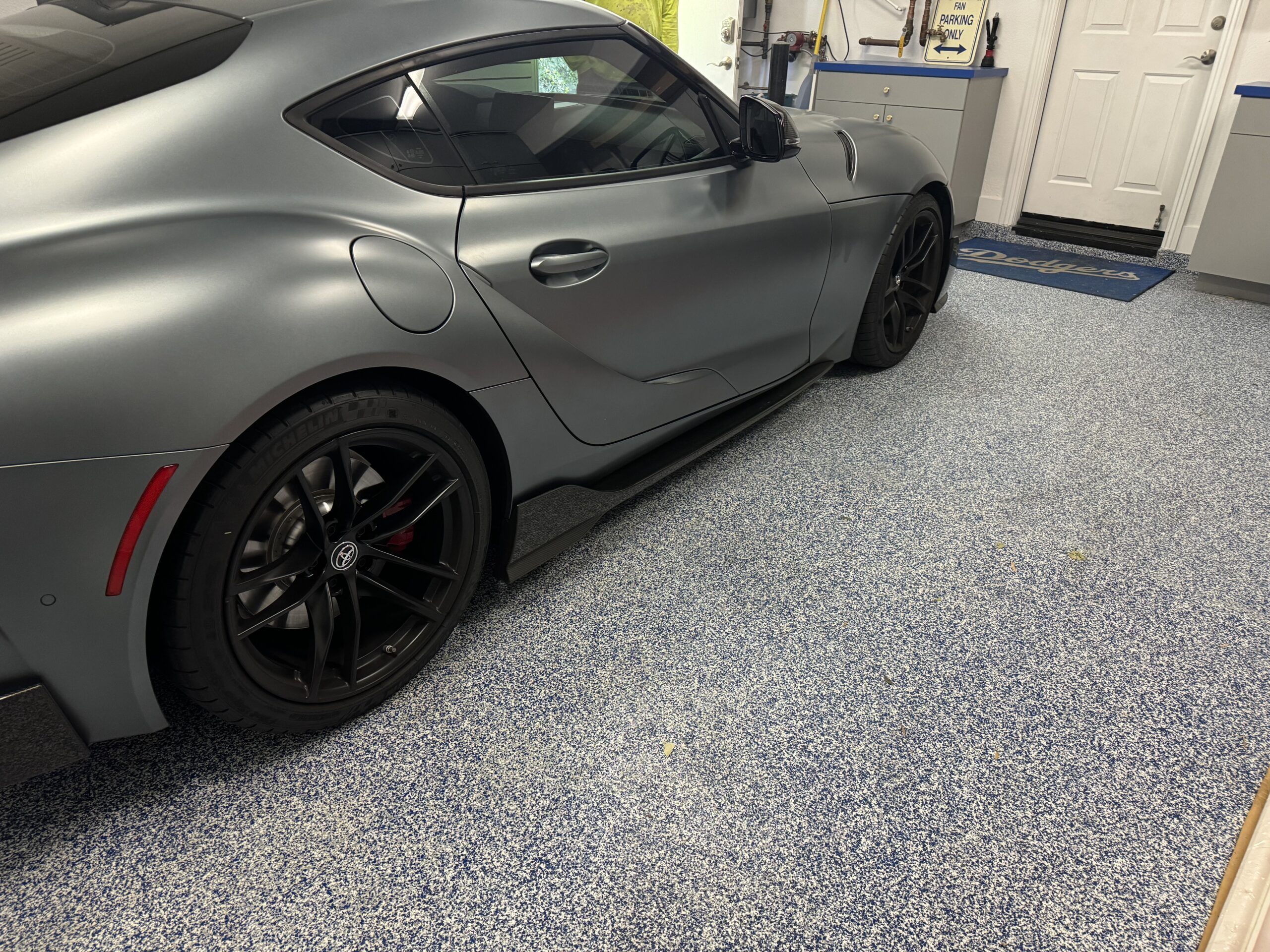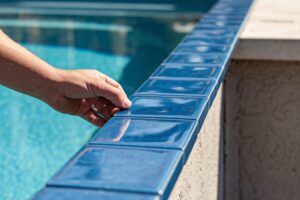Why Choose Epoxy Flooring for Your Garage?
Garage epoxy flooring stands out as a powerhouse solution for homeowners seeking both style and substance. Unlike cold, dull concrete floors prone to cracking and staining, epoxy transforms the garage into a polished, easy-to-maintain space. But why is epoxy such a popular choice?
✔ Durability Beyond Compare: Epoxy flooring withstands the weight of cars, bikes, tools, and even the occasional dropped wrench without chipping or cracking. Its chemical resistance makes oil spills and brake fluid leaks a non-issue.
✔ Aesthetic Appeal: With finishes ranging from simple solid colors to stunning metallic swirls, epoxy can complement any garage style—whether you’re going for a minimalist look or a luxury showroom vibe.
✔ Effortless Maintenance: Epoxy repels stains, resists dust accumulation, and is easy to clean with a quick mop or hose down. No more scrubbing oil stains out of porous concrete!
✔ Cost-Effective in the Long Run: While the initial investment may seem steep, epoxy’s durability means fewer repairs and longer intervals between replacements compared to traditional flooring options.
A garage with an epoxy floor isn’t just functional—it’s a conversation piece.
Garage Epoxy Flooring Cost Breakdown
Understanding epoxy flooring costs is essential for budget planning. The price of epoxy floors varies based on the type of coating and the size of your garage. Investing in high-quality materials pays off in longevity and reduced maintenance.
Cost Table for Different Epoxy Types:
| Epoxy Type | Cost per Sq. Ft. | 2-Car Garage (400 Sq. Ft.) | 3-Car Garage (600 Sq. Ft.) |
| Basic Epoxy Floor Paint | $3 – $5 | $1,200 – $2,000 | $1,800 – $3,000 |
| Standard Epoxy with Flakes | $5 – $8 | $2,000 – $3,200 | $3,000 – $4,800 |
| Metallic Epoxy Finish | $8 – $12 | $3,200 – $4,800 | $4,800 – $7,200 |
| High-Performance Epoxy Resin | $10 – $15 | $4,000 – $6,000 | $6,000 – $9,000 |
💡 Pro Tip: Higher-quality epoxy, such as metallic or high-performance resin coatings, extends your floor’s lifespan and reduces repair costs over time.
What Influences the Cost of Garage Epoxy Flooring?
Several factors impact the total cost of your epoxy flooring project:
- Surface Preparation: Grinding, patching cracks, and ensuring the surface is spotless can add to labor costs.
- Number of Coats: More layers mean a thicker, more durable surface but also a higher price.
- Additives: Non-slip coatings, UV protection, and decorative flakes can increase costs.
- Labor: Professional installation ensures quality but comes at a premium.
Popular Garage Floor Epoxy Colors & Finishes
The aesthetic options for epoxy flooring are endless, allowing homeowners to customize their garage to their liking. Whether you want a sleek, modern look or a rugged, textured finish, there’s an epoxy style to suit your vision.
Table of Epoxy Finishes and Their Best Uses:
| Epoxy Type | Color Options | Best For |
| Solid Epoxy Colors | Gray, Tan, Blue, Red, Black | Minimalist, modern aesthetics |
| Flake Epoxy Flooring | Blends of black, white, gray, blue, or tan | Slip-resistant, textured finishes |
| Metallic Epoxy Flooring | Silver, Copper, Blue, Bronze, Custom swirls | High-end, showroom-style spaces |
| Epoxy Floor Paint | Basic colors with glossy or matte finishes | Budget-friendly upgrades |
Trending Epoxy Colors for Garages:
🎨 Gray and Charcoal: Timeless, modern, and hides dirt well.
🎨 Metallic Blue or Copper Swirl: Adds a stunning, custom 3D effect.
🎨 Tan or Beige Flakes: Neutral, with a textured finish that conceals imperfections.
🎨 Custom Color Blends: Tailor your garage to match your car, home style, or personal taste.
Custom blends make it possible to create one-of-a-kind designs, from sports team colors to sleek, metallic finishes that shimmer under the light.
Epoxy Floor Paint vs. Epoxy Resin: What’s the Difference?
The terms “epoxy paint” and “epoxy resin” are often confused, but they are not the same product. Understanding the difference can help you choose the right solution for your garage.
Comparison Table: Epoxy Floor Paint vs. Epoxy Resin Coating:
| Feature | Epoxy Floor Paint | Epoxy Resin Coating |
| Durability | Low | High |
| Thickness | Thin (1-2 mils) | Thick (20-30 mils) |
| Resistance | Moderate (wears easily) | High (resists chemicals, stains) |
| Best For | Light-duty garages | High-traffic and commercial spaces |
Which One Should You Choose?
Go with epoxy resin coatings for a durable, long-lasting garage floor that can withstand daily abuse from vehicles, tools, and chemicals.
Avoid epoxy paint for high-traffic areas—it’s better suited for light-duty applications or budget-friendly DIY refreshes.
Is Metallic Epoxy Worth It for Garage Floors?
Metallic epoxy flooring isn’t just a coating—it’s art for your floor. The unique patterns created during the application process result in a finish that mimics flowing lava, shimmering water, or a cloudy sky. But is it worth the premium price tag?
Benefits of Metallic Epoxy for Garages:
✔ Stunning 3D Visual Effects: Metallic epoxy produces a high-gloss, mirror-like finish with mesmerizing swirls and depth.
✔ Superior Durability: More resistant to chemicals, stains, and impacts compared to standard finishes.
✔ Unique Designs: Every metallic epoxy floor is one-of-a-kind—no two floors look exactly the same.
✔ Increased Home Value: Ideal for car collectors and enthusiasts seeking a luxury showroom appeal.
The downside? Metallic epoxy costs more than standard options, but for those seeking a standout garage space, it’s worth every penny.
How Long Does Garage Epoxy Flooring Last?
The lifespan of garage epoxy flooring depends on several factors, including the type of epoxy, installation quality, and how well you maintain it.
Lifespan of Different Epoxy Types:
| Epoxy Type | Lifespan (Years) |
| Basic Epoxy Paint | 3 – 5 |
| Standard Flake Epoxy | 5 – 10 |
| Metallic Epoxy | 10 – 20 |
| High-Performance Resin | 15 – 25 |
Proper maintenance, such as regular cleaning and avoiding harsh chemicals, can extend the lifespan of your epoxy floor even further.
Can You DIY Epoxy Your Garage Floor?
DIY epoxy kits have surged in popularity, but is tackling this project yourself a good idea?
Pros of DIY Epoxy Installation:
✔ Lower Cost: Save on labor costs.
✔ Flexibility: Work at your own pace.
✔ Satisfaction: The joy of completing a DIY project.
Cons of DIY Epoxy Installation:
🚫 Surface Prep Challenges: Grinding concrete and removing old coatings requires specialized equipment.
🚫 Adhesion Issues: Improper prep can lead to peeling and bubbling.
🚫 Shorter Lifespan: DIY kits are often lower in quality and thinner than professional-grade epoxy.
How to Maintain a Garage Epoxy Floor
Epoxy floors are low maintenance, but a little care goes a long way.
Epoxy Floor Care Tips:
- 🧽 Sweep Regularly: Use a soft broom or dust mop to prevent scratches.
- 🚫 Avoid Harsh Chemicals: Clean with mild, non-abrasive detergents.
- 🛞 Use Mats Under Tires: Prevent hot tire pickup, which can occur with lower-grade epoxies.
- 💧 Wipe Spills Immediately: Especially oil, gasoline, or brake fluid.
Get a Garage Epoxy Flooring Quote Today!
Ready to transform your garage into a polished, durable space? Contact our epoxy flooring experts for a free, no-obligation quote. We specialize in high-quality installations, from standard flake designs to luxurious metallic finishes.
FAQs
Is epoxy coating in a garage worth it?
Absolutely! Epoxy floors protect your concrete, resist stains, and add style. It’s a durable investment that pays off through easy maintenance and long-lasting performance.
Can I epoxy my garage myself?
You can, but professional installation offers better results. Professionals use industrial-grade materials and ensure proper surface prep, resulting in a floor that lasts longer and looks better.
How much epoxy is needed for a garage?
A standard two-car garage (400 sq. ft.) requires about 2-3 gallons of epoxy for a single coat. Adding flakes or additional coats increases coverage needs.
How long does garage epoxy last?
With professional installation and proper maintenance, epoxy floors can last 10 to 20 years or more. High-performance resin coatings last even longer.
Is garage epoxy slippery?
Epoxy can be slippery when wet, but adding anti-slip aggregates during installation provides texture and improves traction.
Garage epoxy flooring is the ultimate blend of durability, beauty, and practicality. Whether you’re seeking a budget-friendly solid color or a stunning metallic swirl finish, there’s an epoxy solution tailored to your style and needs.







Leave a Reply
Your email is safe with us.